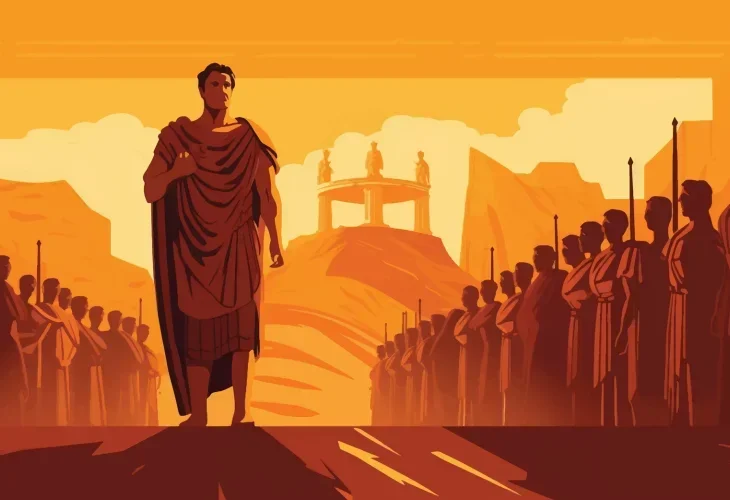From Rebellion to Ruins: The Jewish Revolt and Roman Retreat
King Agrippa arrived on Tisha B'Av, leading 3,000 troops to suppress the rebellion but was defeated. Roman soldiers in the fortresses around Jerusalem were slaughtered. The king's palace and archives were burned. By Tu B'Av, the zealots had triumphed.
 (Illustration: shutterstock)
(Illustration: shutterstock)The events at the Temple in 66 were seen as a declaration of revolt against Rome: blocking the procurator from entering the Temple and declaring they would not accept his authority. Yet, perhaps there was still a chance to retreat, to appeal to the emperor, swear loyalty, and clarify that the issue was with the procurator, not all of Rome.
But then the Sicarii entered the scene, a Jewish zealot faction initially fighting Roman rule over the land. The Sicarii were named for the short dagger called a sicarius they wielded, targeting anyone deemed insufficiently loyal to their sacred principles. Menahem ben Judah, the Sicarii leader, seized the opportunity, capturing the fortress of Masada in the Judean Desert, massacring the Roman garrison, and taking over the fortress.
In Jerusalem, too, a disconnect with the Romans formed. According to protocol, sacrifices were regularly offered for the Roman emperor. A Jew named Bar Kamtza, affected by a group of sages' silence during his expulsion from a feast, undermined the effort. Bar Kamtza inflicted a hidden blemish on a lamb, a minor lip cut the Romans couldn't see but halachically disqualified the offering, prohibiting it from being sacrificed. The priests in the Temple considered offering it anyway for safety's sake. However, a sage named Rabbi Zechariah ben Avkulas stopped them, leading the sages to say, "Zechariah's humility destroyed the Temple." The sacrifice wasn't offered, interpreted as rebellion. Elazar ben Hananiah assumed control of the Temple, announced its revolt against Rome, and refused their orders.
King Agrippa arrived on Tisha B'Av with 3,000 troops to quash the rebellion but was defeated. Roman soldiers in the fortresses around Jerusalem were slaughtered. The king's palace and archives were burned. By Tu B'Av, the zealots had triumphed. Menahem ben Judah marched from Masada with a Sicarii regiment and took over Jerusalem. The move displeased the Jerusalem zealots, who executed him with torture. Elazar ben Hananiah became the rebellion's commander and annihilated all Roman soldiers in Jerusalem. He continued to massacre Romans on Shabbat, viewed as a transgression by the sages, who didn't see it as life-saving.
Throughout the summer, Jewish bands took over major cities in Israel, eradicated Romans, and also attacked others oppressing Israel. Romans lost complete control of the land.
In winter 66, four years before the destruction, Syrian procurator Cestius Gallus descended to Israel with a 36,000-strong army, trying to restore Roman dominance. He conquered and destroyed cities in the Galilee, reaching Lod during Sukkot when all Jews were on a pilgrimage to Jerusalem. He burned the empty city and advanced to Jerusalem via Gibeon (today's Highway 443). As he approached Beit Horon, where Joshua ben Nun defeated the Canaanites and Judah Maccabee triumphed over the Greeks, two zealot battalions attacked him. Adiabene fighters descended from the hill, slaughtered 500 Roman soldiers, including 120 horsemen, and Simon ben Giora, a zealot leader, confiscated the pack animals.
Gallus reached Jerusalem limping and weary, attempted to capture it but withdrew under zealot attacks, while his dwindling supplies were threatened by the early onset of Jerusalem's winter. He ordered a retreat. The rebels seized the opportunity, pursuing his retreating army to harass them.
Gallus encamped in Gibeon and decided to withdraw entirely from Israel. Foolishly, he again passed through the Beit Horon descent, where rebels nearly annihilated him. Luckily, the dark night halted the massacre. 5,300 Roman soldiers and 430 horsemen perished, while the Jews seized an abundance of weapons, gold, and the legion's revered eagle standard, with nearly no losses on their side. Gallus fled Israel in disgrace and soon died of a broken heart. The rebels celebrated their victory on 3rd of Cheshvan 66 (3067). They entered Jerusalem singing psalms, believing salvation had come to Israel.

